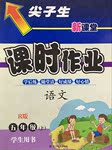题目内容
Living things are dying out quickly. Let’s ask ____ destroying them in the past years.
A. what part people have been playing B. people have played in
C. what part people have played in D. people have been playing what part
C
what part引导宾语从句,在从句中做played的宾语。

 尖子生新课堂课时作业系列答案
尖子生新课堂课时作业系列答案 英才计划同步课时高效训练系列答案
英才计划同步课时高效训练系列答案第四部分:任务型阅读(共10小题;每小题1分,满分10分)
请认真阅读下列短文,并根据所读内容在文章后表格中的空格里填入一个最恰当的单词。
注意:请将答案写在答题卡上相应题号的横线上。每个空格只填1个单词。
For more than twenty years scientists have been seeking to understand the mystery of the‘‘sixth sense"of direction.By trying out ideas and solving problems one by one,they are now getting closer to one answer.
One funny idea is that animals might have a built-in compass(指南针).
Our earth itself is a big magnet(磁体).So a little magnetic needle that swings freely lines
itself with the big earth magnet to point north and south.When people discovered that idea about athousand years ago and invented the compass,it allowed sailors to navigate (航海)on oceanvoyages, even under
cloudy skies.
Actuallly the idea of the living compass came just from observing animals in nature.
Many birds migrate twice a year between their summer homes and winter homes.Some of them fly for thousands of kilometers and mostly at night.Experiments have shown that some birds can recognize star patterns.But they can keep on course even under cloudy skies.How can they do that?
A common bird that does not migrate but is great at finding its way home is the homing pigeon.Not all pigeons can find their way home.Those that can are very good at it,and they have been widely studied.
One interesting experiment was to attach little magnets to the birds’ heads to block their
magnetic sense—just as a loud radio can keep you from hearing a call to dinner.On sunny days, that did not fool the pigeons.Evidently they can use the sun to tell which way they are going.But on cloudy days,the pigeons with magnets could not find their way.It was as if the magnets had blocked their magnetic sense.
Similar experiments with the same kind of results were done with honeybees.These insects also seem to have a special sense ot direction.
In spite of the experiments,the idea of an animal compass seemed pretty extraordinary.How
would an animal get the magnetic stuff for a compass.
An answer came from an unexpected source.A scientist was studying bacteria that live in the
mud of ponds and marshes.He found accidentally little rod-like bacteria that all swam together in
one direction—north.
Further study showed that each little bacterium had a chain of dense particles inside,which
proved magnetic.The bacteria had made themselves into little magnets that could line up with the
earth’s magnet.
The big news was that a living thing,even a simple bacterium,can make magnetite.That led
to a search to see whether animals might have it.. By using a special instrument called magnetometer,scientists were able to find magnetite in bees and birds,and even in fish.In each
animal,except for the bee.the magnetic stuff was always in or closer to the brain.
Thus.the idea of a built—in animal compass began to seem reasonable.
| The Magnetic Sense — The Living Compass | |
| Passage outline | Supporting details |
| The existence of the earth magnet and the invention of the navigating compass | ◇Our earth is a big magnet and a little freely (71) ▲ magnetic needle lines itself with the earth magnet to point north and south. ◇(72) ▲ on the idea above, the navigating compass was invented. |
| The possibility of birds’ built-in compasses | ◇ One piece of evidence is the (73) ▲ of many birds between their summer homes and winter homes. ◇ Birds can recognize star patterns on clear nights and keep on course (74) ▲ under cloudy skies |
| The (75) ▲ on pigeons’ and bees’ built-in compasses | ◇Little magnets were tied to the pigeons’ heads to (76) ▲ their magnetic sense. ◇The pigeons’ magnetic sense seemed to be affected on (77) ▲ days. ◇Similar things with the same results were done with bees. |
| The (78) ▲ of the magnetic stuff for the animal compass | ◇Little rod-like bacteria were found by chance to swim together in the direction of (79) ▲ . ◇Some animals had a chain of dense magnetic particles in or close to the (80) ▲ inside their bodies. |
The light from the campfire brightened the darkness, but it could not prevent the damp cold of Dennis’s Swamp (沼泽地) creeping into their bones. It was a strange place. Martin and Tom wished that they had not accepted Jack’s dare. They liked camping, but not near this swamp.
“So,” Martin asked as they sat watching the hot coals. “How did this place get its name?”
“Are you sure you want to hear it ? It’s a scary story,” warned Jack.
“Of course!” cried out Tom. “If there were anything to be scared of, you wouldn’t have chosen this place!”
“Ok, but don’t say I didn’t warn you,” said Jack, and he began this tale.
“Way back in time, a man called Dennis tried to start a farm here. He built that cottage over there to live in. In those days, the area looked quite different ---- it was covered with tall trees and the swamp was a crystal-clear river. After three hard years, Dennis had cleared several fields and planted crops. He was so proud of his success that he refused to listen to advice.
“‘You are clearing too much land,’ warned one old man. ‘ The land is a living thing. It will hit back at you if you abuse it. ’
“‘Silly fool,’ said Dennis to himself. ‘If I clear more land, I can grow more crops. I’ll become wealthier. He’s just jealous!’”
“Dennis continued to chop down trees. Small animals that relied on them for food and shelter were destroyed. He was so eager to expand his farm that he did not notice the river flowing slowly towards his door. He did not notice salt seeping to the surface of the land. He did not notice swamp plants choking all the native plants.”
“What happened?” Martin asked. It was growing colder. He trembled, twisting his body closer to the fire.
“The land hit back ---- just as the old man warned,” Jack shrugged. “Dennis disappeared. Old folks around here believe that swamp plants moved up from the river and dragged him underwater. His body was never found.”
“What a stupid story,” laughed Tom. “Plants can’t …” Before he had finished speaking, he screamed and fainted (晕倒). The other two boys jumped up with fright, staring at Tom. Suddenly, they burst out laughing. Some green swamp ivy (常春藤) had covered Tom’s face. It was a while before Tom could appreciate the joke.
【小题1】The underlined word “dare” in Paragraph 1 is closed in meaning to ________.
| A.courage | B.assistance | C.instruction | D.challenge |
| A.To frighten them. |
| B.To satisfy their curiosity. |
| C.To warn them of the danger of the place. |
| D.To persuade them to camp in the swamp. |
| A.The old man envied him. | B.The old man was foolish |
| C.He was too busy to listen to others. | D.He was greedy for more crops. |
| A.He saw Dennis’s shadow | B.He was scared by a plant |
| C.His friends played a joke on him. | D.The weather became extremely cold. |
| A.Grasp all, lose all |
| B.No sweat, no sweet. |
| C.It is no use crying over spilt milk |
| D.He who makes no mistakes makes nothing. |